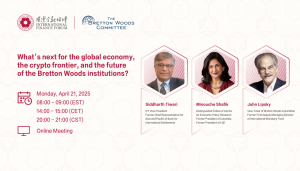
The IFF 31st Academic Workshop Explores Future of Global Economy and BWIs April 22, 2025
Coinciding with the eve of the 2025 Spring Meetings of the World Bank Group and the International Monetary Fund (IMF), the discussion, moderated by Siddharth Tiwari, IFF Vice President and Former Chief Representative for Asia and the Pacific of the Bank for International Settlements, covered a range of topics. These included expectations for the global economy and financial markets and changing relations between major trading blocs.
Key speakers included John Lipsky, Vice-Chair of the Bretton Woods Committee and Former First Deputy Managing Director of the IMF, and Minouche Shafik, Distinguished Fellow of the Centre for Economic Policy Research and Former President of Columbia University.
Lipsky highlighted that since the beginning of this century, U.S. corporate profits have consistently outperformed historical averages, raising questions about the implications of the United States’ new tariff policies on international trade. He noted that, while international trade grew faster than global GDP from 1950 to 2007, this trend has reversed since the abandonment of the Doha Development Round and the introduction of protectionist measures. He warned of a looming contraction in international trade, stating, “A very threatening moment, diametrically counter to the logic of the post-war period.” He urged for trade liberalization among partners to combat rising tariffs and inflationary pressures.
As the panel reflected on the 80th anniversary of the BWIs, they discussed the significant challenges these institutions will face in the coming decades. Lipsky emphasized that the IMF must refine its surveillance and crisis prevention functions, advocating for a more equitable distribution of voting power among members to support effective crisis prevention instruments. He also underscored the importance of addressing climate change's impact on global economic growth and proposed a liquidity mechanism to protect emerging markets.
Shafik remarked that the global trade framework has been fundamentally disrupted, rendering international trade a negative-sum game. The breakdown of established norms has left many feeling “unmoored,” causing investors to hesitate amid tariff uncertainties, which could have long-term repercussions. She advocated for a “coalition of the willing” to counterbalance the U.S. withdrawal from international trade and stressed the need for structural reforms in developing countries to enhance domestic finance. Citing India’s universal ID program as a technological model, she noted its special approach to linking personal data to bank accounts and government services, contrasting it with the systems in the U.S. and Europe.
Tiwari stated that the United Nations Sustainable Development Goals are increasingly out of reach, with the bottom 25 percent of the population continuously slipping. He highlighted that three-quarters of global growth is expected to emerge from the Global South.
Additionally, LIN Jianhai, IFF Executive Vice President and Former Secretary of the International Monetary Fund, announced the release of Part Two of the IFF Global Artificial Intelligence Competitiveness Index Report, titled "Analyzing AI Competitiveness From the Research Innovation Perspective." He highlighted the report's role in defining and guiding the future of global AI development. While enterprise deployment is vital, research and innovation are essential for long-term competitiveness, serving as the foundation for breakthroughs and talent development. This report analyzes over 2 million AI-related scientific publications and patents globally, reflecting the current state of AI research and signaling each country's potential to lead future transformative breakthroughs. The report is available for viewing on the IFF website at https://www.ifforum.org/.
Yixin Sui
International Finance Forum
email us here
Visit us on social media:
LinkedIn
Facebook
X
Distribution channels: Banking, Finance & Investment Industry, Business & Economy, Conferences & Trade Fairs, International Organizations, World & Regional
Legal Disclaimer:
EIN Presswire provides this news content "as is" without warranty of any kind. We do not accept any responsibility or liability for the accuracy, content, images, videos, licenses, completeness, legality, or reliability of the information contained in this article. If you have any complaints or copyright issues related to this article, kindly contact the author above.
Submit your press release

